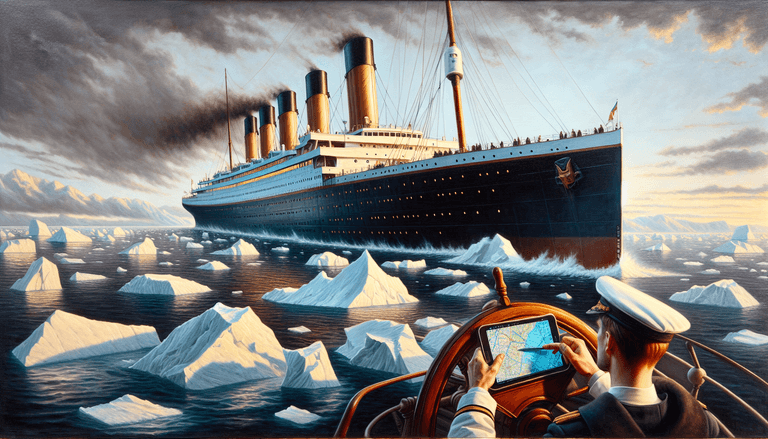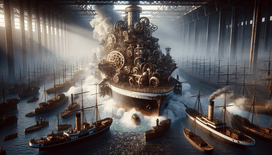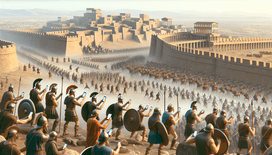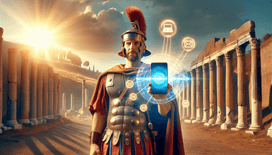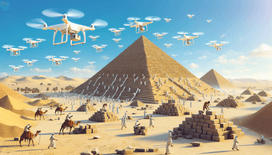Ah, the grand Titanic, an emblem of opulence and hubris, sailing forth with the self-assuredness of a peacock strutting down a catwalk. Little did they know, her maiden voyage across the icy North Atlantic would end not with a triumphant docking but with a resounding splash that reverberated across history. But let us engage our imaginations and plunge into an alternate reality, where our dear RMS Titanic was equipped with the ultimate lifeline of the 21st century: the smartphone.
Picture, if you will, the year 1912 infused with a sprinkling of silicon chips and digital dexterity. Passengers step aboard clutching not glossy travel brochures, but the gleaming black mirrors of smartphones. One can almost hear the dulcet tones of polite notifications and the distinct, melodic hum of social media scrolling as they clamber up the gangway. As the Titanic departed from Southampton, every passenger would be busily posting selfies with captions like "Feeling unsinkable today! #BonVoyage."
Weather apps to the rescue
Gone are the days where Captain Edward Smith relied solely on the whispers of the sea and the occasional piece of hand-delivered paper. Instead, he scrolls through a highly rated weather app, eyebrows furrowed as he notes an ominous emoji depicting an iceberg right in their path. Hmm, that does seem slightly concerning, he muses, digitally tapping to view the in-depth forecast.
"Perhaps," thinks the good captain, "we shall voyage a touch further south," all while forwarding screenshots of the alert to the ship's helmsman with a simple tap. In this world, there's no room for relying on mere visual acuity to spot a ludicrously large chunk of ice at midnight. Oh no, we've got push notifications for that sort of thing.
Social media as a lifeline
Now, let’s not overlook the power of social media. With nearly everyone aboard equipped with smartphones, the wireless radio needn't have been their sole link to civilisation. Instead, around 11:40 PM on that fateful night, smartphones begin lighting up like the proverbial Christmas tree with passengers nimbly tapping out 140-character missives.
- @John_Jacob: Eek! Iceberg on the horizon. Not even Jack can paint us out of this one! #ColdReality #OMIceberg
- @LadyAstor1912: Water invading my first-class suite! Rather inconsiderate, I'd say. Steer clear chaps. #IcyReception
Before you know it, the hashtag #SaveTheTitanic is trending globally. With rapid-fire tweets, posts, and shares, the plight of the unsinkable ship reaches the far corners of the globe faster than you can mutter "bandwidth." Authorities on shore are alerted at lightning speed, rallying rescue ships with unprecedented haste.
Modern communication aids navigation
While chaos reigns and the strings of the orchestra valiantly proceed with "Nearer, My God, to Thee," the ship's officers are busy on conference calls with other vessels. Using a popular navigational app, they set a course for the nearest ship, the Carpathia, practically plotting a route faster than you can locate the nearest coffee shop on Google Maps.
The crew aboard the Carpathia, already briefed through text updates and eager to play the role of heroes, races to the rescue, their captain confidently steering through the blackened sea as his phone's screen illuminates the treacherous journey.
A predicament avoided or postponed?
One might argue, dear reader, that while smartphones could have altered the Titanic’s headline-grabbing destiny, human nature in its infinite wisdom might still find new and creative ways to bungle its bounty of benefits. Perhaps Captain Smith's attention would have been consumed by the latest cat video or a riveting podcast series entitled "How to Steer Clear of Crashes in '12 Easy Steps’." Or maybe the officers, heads buried deeply in simultaneous chess games with children back home, would be no less oblivious to the looming risks.
Yet, one cannot underestimate the inexorable momentum of technological progress, as smartphones bridge the chasm between isolation and interconnectedness. Whether as a saviour or a gentle nudge towards a different catastrophe, smartphones reimagine the Titanic's voyage altogether.
So, here's a modern-digital scoop: while historical nerdery delights in "what could have been," let's remember your own phone serves as your compass, beacon, and occasional distraction. Use it wisely, lest you find yourself metaphorically adrift, chatting away in a pixelated ocean of possibilities.
